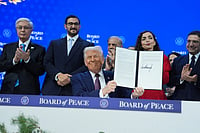The window of opportunity on the Indo-US nuclear deal might be closing, unless the department of atomic energy (DAE) quickly prepares a blueprint for separation of civilian and nuclear facilities. On this blueprint hinges the US government's ability to steer a legislation through Congress, thereby paving the way for cooperation on the civilian nuclear side as envisaged in the July agreement.
Only when the plan is developed can it be shared with Washington, which will determine whether the separation plan is credible enough to sustain its course through Congress. Then, senior government sources say that there is scope for "informal fine-tuning", if such changes are necessary and have no adverse impact.
So, what's the urgency? Sections of the US government feel that the best chance of piloting the plan through Congress will be before President George Bush visits New Delhi, probably at the end of February next year. "The sooner we have a plan, the sooner it will be possible to get a legislative change. The best case scenario is before Bush's visit. After the visit, the political momentum will not be available," a senior government source said.
If the deal is not piloted through Congress before Bush visits India, then other imponderables could kick into play. For one, the opponents of the deal in the US could consolidate their hold, exploiting the congressional elections next year to their advantage. All 435 seats in the House of Representatives are up for election, as also one-third of the Senate. There is the possibility that Republicans, who currently control the Senate, could face a tough time getting elected. These developments could make the Bush administration's legislative task cumbersome.
The delay in evolving a separation plan arises from its complexity. Sources say New Delhi has resisted efforts to indicate some kind of capping on India's production of fissile materials (nuclear fuel). This is despite India saying it was willing to accept the same kind of responsibilities as other nuclear powers. These sources are also clear that whatever separation plan is presented to the Americans, it is not going to give "any accounting of our nuclear facilities". That is, India has only to furnish a list of civilian facilities—and not military ones. The efforts of the Americans would be to satisfy themselves that the equipment and other resources are not diverted to military nuclear programmes.
In Washington, state department sources say they have discussed the separation plan with the Indian government on numerous occasions. And, contrary to some press reports, under secretary Nick Burns has not provided a "blueprint" on how to separate India's civilian and military nuclear facilities. But Washington has indicated to the Indian government that, "in order for the Nuclear Suppliers Group (NSG) and Congress to make the necessary accommodations that allow full civil nuclear trade with India, the civil-military separation plan must be credible, transparent and defensible from a non-proliferation standpoint."
Both the NSG and Congress have indicated that it will be important for India to begin fulfilling its July 18 commitments before they can take action to enable civil nuclear trade with India. But will new conditions be imposed on India? This question assumes importance because in the recent congressional hearings on the Indo-US nuclear deal, there were some who had suggested introducing new conditions into the deal before securing the endorsement of Congress.
State department sources, however, suggest this isn't going to happen, and point to under secretary Robert Joseph's statement—"we should not let perfect be the enemy of the good". The sources further added, "The July 18 joint statement represents a good deal for both the US and India and is a net gain for non-proliferation. We have no plans to modify this initiative and have urged NSG partners and members of Congress to avoid adding conditions that would potentially break the deal." So, keeping all the comlexities in mind, can the DAE deliver?
Quick, The Plan
India's nuclear plan better be ready before Bush's visit

Quick, The Plan
Quick, The Plan
Published At:
MOST POPULAR
WATCH
MORE FROM THE AUTHOR
×




















